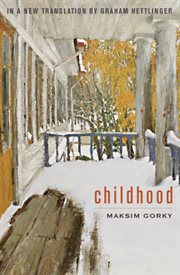Nonfiction
eBook
Details
PUBLISHED
Made available through hoopla
DESCRIPTION
1 online resource
ISBN/ISSN
LANGUAGE
NOTES
Aleksey Peshkov overcame indigence, violence, and suicidal despair to become Maksim Gorky, one of the most widely read and influential writers of the twentieth century. Childhood, the first book in Gorky''s acclaimed autobiographical trilogy, depicts his early years, when after his father''s death he was taken to live in the home of his maternal grandfather, a violent and vindictive man who both provided the child with a rudimentary education and subjected him to savage beatings. With remarkable freshness and candor, Gorky immerses his reader in a young child''s world, recreating in dynamic prose a boy''s bewilderment at the senseless cruelty that surrounds him, his solace in the quiet beauty of the natural world, and his often funny, guileless observations of the many vivid characters who enter his early life. At the center of this story stands Gorky''s grandmother, Akulina Kashirina, one of Russian literature''s most remarkable heroines. Her tender love for her grandson serves as a vital antidote to the brutality that threatens to consume him. Her buoyant faith in a merciful, loving, but limited God provides the young Gorky with a life-affirming alternative to the vengeful, omniscient deity his grandfather worships ardently. Although often unsettling in its portrayal of the poverty and ignorance that gripped nineteenth-century Russia, Childhood is ultimately a heartening account of a young boy''s formative struggle to overcome the limitations of a decaying and corrupt society, and the remarkable old woman who enabled him to succeed and instilled in him an abiding, fierce compassion for Russia''s destitute and defenseless. Childhood is freshly and beautifully translated by Graham Hettlinger, lauded for his translations of Ivan Bunin. A new, vigorous translation of the first installment of Gorky's three-volume autobiography, first published in 1914. Hettlinger, who directs international study programs at Georgetown University and translated The Collected Stories of Ivan Bunin (2007), begins with a swift summary of Gorky's life (1868-1936), from his impoverished childhood ('Dickensian' is far too feeble a term) to his disturbing late-life pro-Soviet positions. (Gorky is a pen name; he was born Aleksey Peshkov.) The first volume of his autobiography is a stunning work-intense, violent, loving, wrenching, funny and frightening. It begins with the little boy viewing the body of his dead father. Soon after, another horrific scene-his mother giving birth on the floor to a little brother who quickly died-and then his father's burial in the rain. All of this occurs in the first five pages. Gorky eventually moved in with his grandparents. His grandfather was explosively violent (beatings were routine), while his grandmother was more compassionate and protective. The grandmother was also an engaging storyteller, and Gorky distributes throughout the memoir a number of her affecting tales-verbatim. As his boyhood advanced, his living situation deteriorated, with the family moving into a series of increasingly dilapidated lodgings. Nonetheless, the author found himself drawn to a number of boarders and neighbors. Among the first is 'Gypsy,' who helped out with their dyeing business, but soon died after doing a heavy-lifting chore for the family. Another boarder they all called 'A Fine Business' (one of the man's default phrases). Though he was a loner, Gorky befriended him, a relationship the family did not tolerate, and they eventually expelled the man from the house. The volume ends with the death of his mother, and the author, 11 years old and homeless, adrift on poverty's sluggish river. Gorky's paragraphs are stark photographs of horror and hope. A young boy absorbs the brutal splendor of Russia in the 1870s in this new translation of a classic literary memoir. Russia's great proletarian novelist recounts his childhood years in the house of his grandfather, a businessman whose slide into bankruptc
Mode of access: World Wide Web







